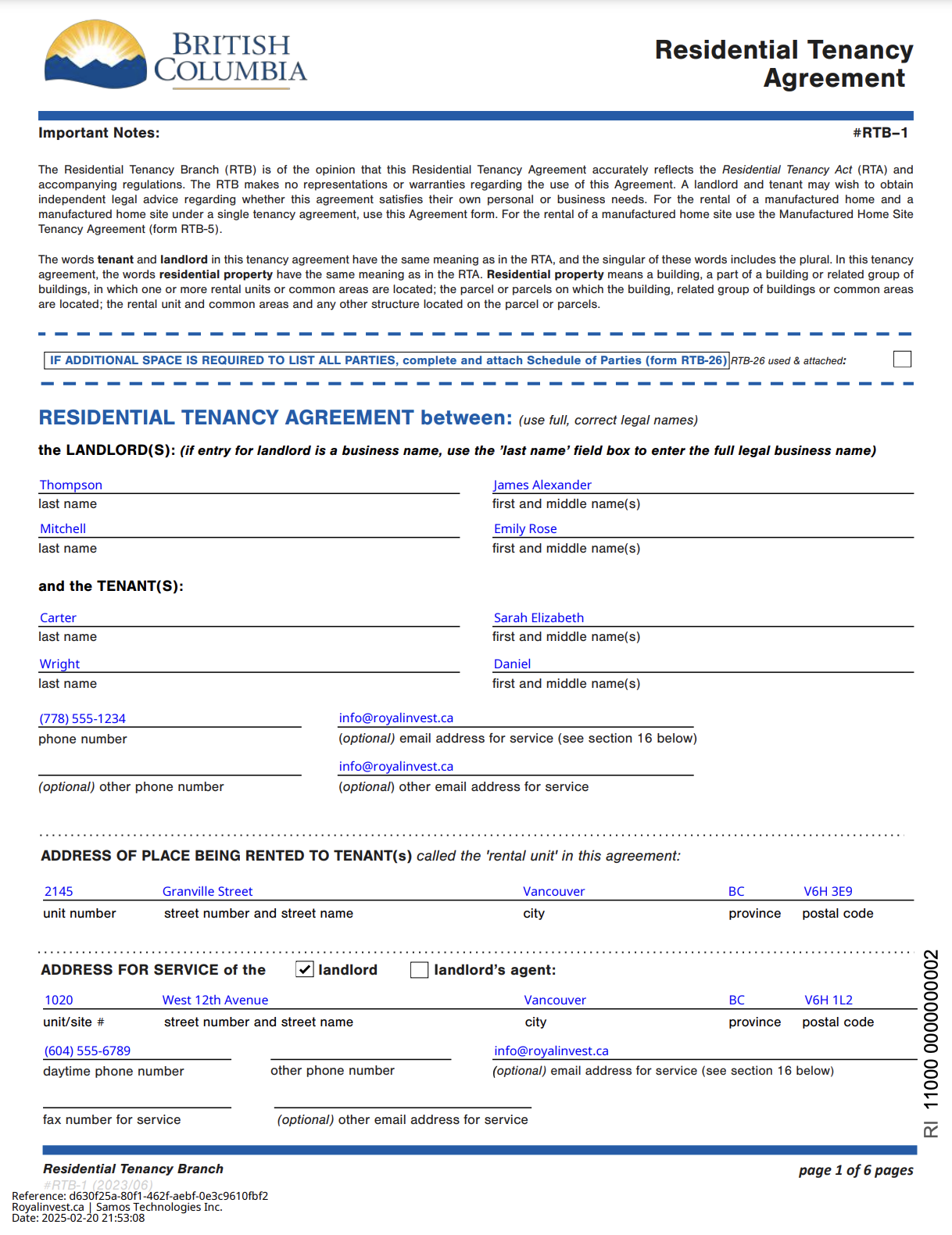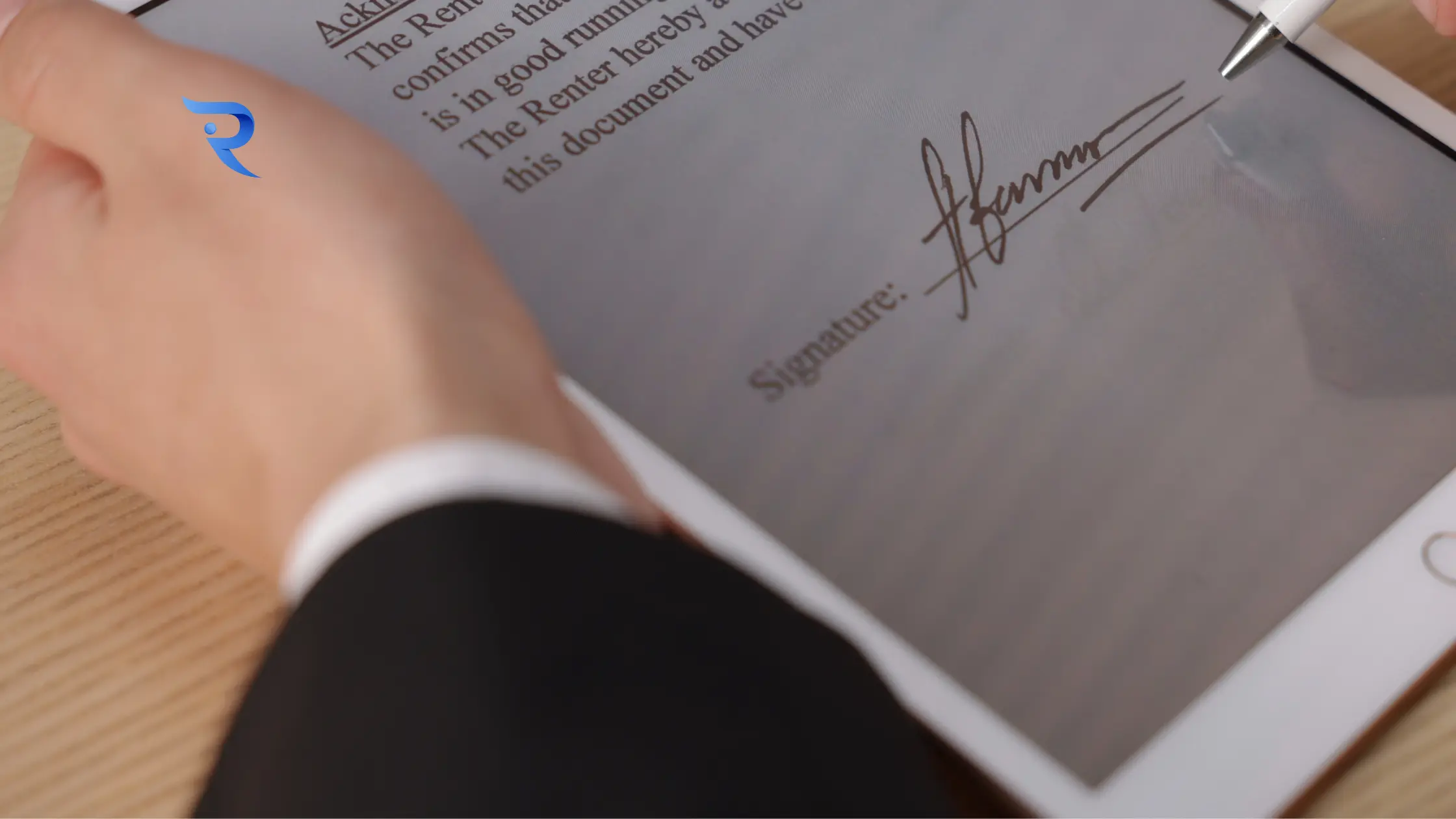Table of Contents
Guessing is not an option, when it comes to finding reliable tenants. A Rental Credit History Check gives landlords and property managers a clear picture of a future tenant’s financial situation and responsibility. It helps them to answer to an important question, which is “Will they pay rent be paid on time?”
If you’re renting out a property in British Columbia, a proper rental agreement is your foundation for a smooth, professional, and stress-free rental experience.
A BC rental agreement is a written contract between a landlord and a tenant that clearly outlines the rules, responsibilities, and expectations for both sides. It’s where you define simple but important details, such as how much the rent is, when it should be paid, who’s responsible for maintenance, and what happens if something goes wrong.
Think of it as your roadmap for the entire rental relationship. Without it, small misunderstandings can easily turn into major conflicts. With a well-written agreement, everything is clear from the beginning and there is less room for confusion
In BC, having a rental agreement isn’t optional. It is guided by the Residential Tenancy Act. It sets out exactly what must and must not be included in the agreement. In short, a BC rental agreement protects your investment, saves you time, and helps you build better relationships with your tenants.
Key takeaways:
- A BC rental agreement keeps rentals smooth and professional.
- It sets clear rules for landlords and tenants.
- Use the official RTB form to avoid mistakes.
- Include names, address, rent, payment, lease dates, and security deposit.
- Define maintenance, repairs, inspections, and entry rules.
- Avoid illegal, vague, or overly strict clauses.
- Online tools like Royalinvest.ca make creation, signing, and tracking easy.
- A good rental agreement saves time, reduces disputes, and protects everyone.
BC Rental Laws
Before you even start drafting your rental agreement, it’s important to understand the legal framework that governs rental relationships in British Columbia. The backbone of rental law in BC is the Residential Tenancy Act (RTA). It outlines certain the rights and responsibilities of both landlords and tenants.
The RTA covers everything from when the landlord needs to send the notice before entering a rental a unit, to limits on security deposits and the rules around ending a tenancy. These are not just a bunch of rules, they help prevent misunderstandings and disputes.
One of the easiest ways to make sure your rental agreement complies with the law is to use the free official form of BC rental agreements provided by the Residential Tenancy Branch (RTB). These forms include all the mandatory terms required by the RTA, so you won’t accidentally leave something out or add a clause that’s illegal.
Many landlords try to create their own custom agreements, which isn’t wrong as long as they meet all the legal requirements. But the truth is that using the official RTB form is the safest and simplest approach. You can always add legal optional clauses for things like pets, parking, or utilities, but the core of your agreement should always follow the template set by the RTB.

What To Include In BC Rental Agreement
In BC tenancy agreement there are clauses that every landlord and property manager should include to make the agreement legally valid and effective.
First, you need to include the basic information about the landlord and the tenant. For this section you should use the full legal names. Nicknames or informal references can cause problems if there’s ever a dispute. The agreement also needs to clearly state the address of the rental unit, including an apartment number if applicable.
The rent amount and payment method should be spelled out in precise terms. This means stating exactly how much rent is the rent, when it must be paid, and which payment methods are acceptable: an e-transfer, cheque, or direct deposit. For fixed-term leases, it’s important to clearly define the start and end dates in the BC lease agreement. For month-to-month agreements, you should clearly state the starting date. Being specific helps prevent misunderstandings.
Beyond the basics, a strong BC rental agreement also covers the responsibilities and rights of both parties. One key clause is the security deposit. In BC, landlords can collect a security deposit and, if applicable, a pet damage deposit. It is equal to a maximum of half a month’s rent. The agreement should clearly state the amount, its purpose, and the conditions of returning it at the end of the agreement.
Maintenance and repairs also need to be addressed. Landlords are responsible for keeping the property safe, while tenants need to report about issues and avoid causing damage. The agreement should clarify expectations for regular unit care, such as lawn care or snow removal.
The agreement must also cover inspections and entry. Landlords have the right to enter a unit, but only with proper notice. It’s important to explain how and when this will happen. In the BC rental agreement, clearly state house rules about pets, smoking, or shared spaces and make sure that your requirements don’t conflict with BC law.
Other important areas include rent increases, late payments, and termination rules. Please note that according to the provincial guideline the rent can be increased once per 12-month period. It should also outline what happens if the rent is late, following the RTA rules.
The more precise and clear you are in your BC rental agreement, the less confusion, disputes, or legal headaches there will be.
Avoiding Common Mistakes In Rental Agreements
Even experienced landlords can make mistakes when creating a BC rental agreement. Usually those mistakes lead to confusion, disputes, or even legal problems. The good news is that most of these errors are easy to avoid if you know what to look for.
Including Illegal Or Unenforceable Clauses
Some landlords include terms that may not correspond with a tenant’s legal rights, like skipping notice periods or charging illegal fees. Even if a tenant signs the agreement, these clauses are not enforceable under BC law. Including them can lead to disputes, complaints to the Residential Tenancy Branch (RTB), or even penalties. Always make sure your clauses comply with the Residential Tenancy Act.
Vague Or Unclear Terms
Using vague language like “pay rent on time” or “keep the property in good condition” can cause misunderstandings. Instead, you need to clearly mention the requirements that both parties understand their responsibilities. For example, instead of “keep the yard tidy,” specify tasks like lawn mowing or snow removal.
Not Updating Agreements After Legal Changes
BC tenancy laws can change over time, including rules about rent increases or notice periods. Using an old or outdated template may put landlords at risk of non-compliance. Regularly reviewing and updating agreements ensures they remain legally valid and protect both parties.
Overly Restrictive Or Unfair Rules
Some landlords include rules that are too strict, such as rules that ban guests completely or restrict normal daily activities. These clauses may be challenged as unreasonable. Agreements should balance property protection with tenants’ rights, following BC law.
How To Make The Process Easier With Royalinvest.ca
Creating, managing, and signing rental agreements can feel like a lot of paperwork, especially if you’re managing multiple units. Thankfully, there are digital tools that make the process much simpler, faster, and more accurate. Using online rental platforms such as Royalinvest.ca allows you to create agreements, add clauses, and store documents all in one place.
E-signatures are another game-changer. Instead of printing, signing, scanning, and emailing or hand-delivering forms, both landlords and tenants can sign the agreement electronically through our platform. Moreover, our platform allows you to track the signing process, so you’ll always know which stage your tenancy agreement is in. This not only saves your time but also creates a digital record that’s easy to store and find whenever you need it.
Overall, using online tools makes rental agreements less stressful, more professional, and legally safer. They free up time so you can focus on managing your properties and tenants rather than drowning in paperwork.

Simplify Your Lease Management
- Draft
- Share for signature
- Sign
- Monitor the signing process
- Download or stock online
One tool for all lease processes.
Conclusion
A well-prepared rental agreement is more than just a piece of paper. It’s the foundation of a smooth and professional rental experience. Accuracy and compliance with BC law protect you as a landlord or property manager, safeguard your tenants’ rights, and reduce the risk of misunderstandings or disputes.
Ready to make the process simple and worry-free? Create, sign and track signing process of your BC rental agreement online at Royalinvest.ca. Our platform guides you step by step, keeps your agreements compliant with the BC laws, and lets you manage all your rental documents digitally, saving time and reducing errors.

![BC Rental Agreement: The Complete Guide for Landlords and Property Managers [Free Download]](https://blog.royalinvest.ca/wp-content/uploads/2025/10/BC_lease_agreement.png)





Leave a Reply